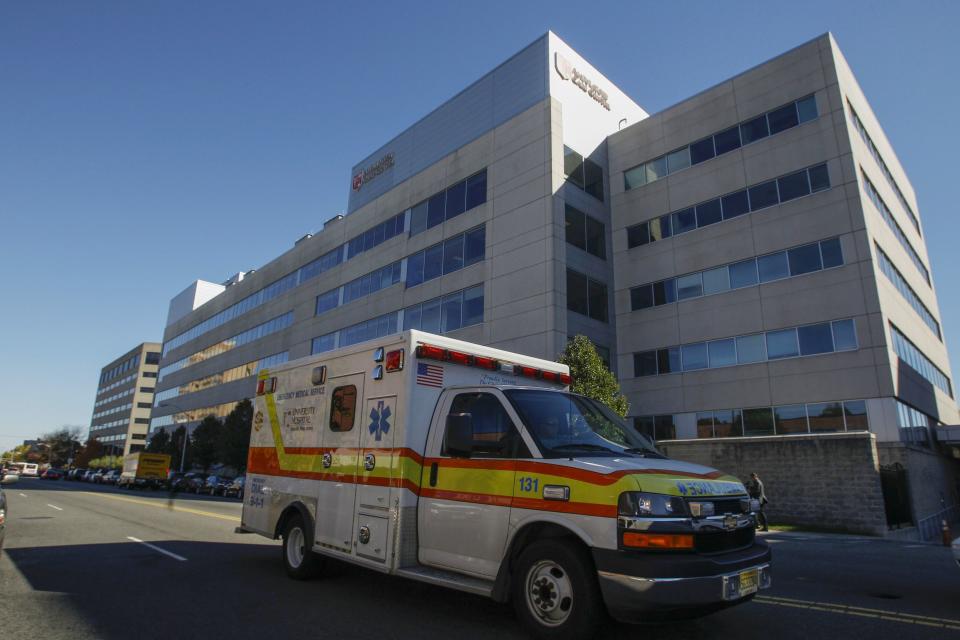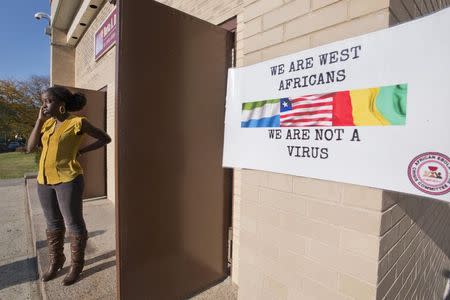Nurse quarantined in New Jersey to go home, boy in New York to be tested for Ebola
By Ellen Wulfhorst NEW YORK (Reuters) - A 5-year-old boy who arrived from Guinea had a low-grade fever and would be tested for Ebola in New York, while a nurse held in quarantine in New Jersey will be allowed to go home, officials said on Monday. Nurse Kaci Hickox, held at a New Jersey hospital under the state's Ebola quarantine policy, does not have any symptoms and can complete her quarantine at home, Governor Chris Christie said on Twitter. Hickox arrived at Newark Liberty International Airport on Friday after treating Ebola patients in West Africa. She said on Sunday she planned to challenge her quarantine in a lawsuit. In New York, a 5-year-boy who visited West Africa and has a low-grade fever would be tested for Ebola, City Health Commissioner Dr. Mary Travis said on MSNBC's "Morning Joe" program. The boy's exposure history to the virus was unclear, she said. "He has ... traveled to one of the three affected countries and has a fever, and that's what triggers an assessment," she said. He would be tested for the virus, with results available later on Monday, she said. His fever was low-grade, she said. Local media said the child lived in New York City's Bronx borough. Four people have been diagnosed with Ebola in the United States. The handling of the first case, a Liberian visitor to Texas in September who died, was riddled with missteps. Two nurses who treated the man contracted the disease but have recovered. The only patient now being treated for Ebola in the United States is a New York doctor, Craig Spencer, who was diagnosed on Thursday. He had worked in Guinea treating Ebola patients with the humanitarian group Doctors Without Borders. The mandatory quarantine policies put in place on Friday by the governors of New York and New Jersey have come under criticism that they may discourage health care workers from traveling to West Africa to help in the fight against Ebola. The virus has killed nearly 5,000 people in West Africa, where Sierra Leone, Liberia and Guinea have been hard-hit. Medical professionals say Ebola is extremely difficult to catch and is spread through direct contact with bodily fluids from an infected person and not transmitted by asymptomatic people. New York Governor Andrew Cuomo struck a conciliatory tone on Sunday about the new quarantine policy after the White House said that mandatory isolation could impede the Ebola fight. Cuomo said New York wanted to encourage personnel to go to West Africa, lauding their "valor" and "compassion" while protecting public safety at home. Health care workers and travelers exposed to people with Ebola and who live in New York may stay in their homes for the 21-day quarantine and be checked upon twice daily by healthcare professionals, Cuomo said, adding the state would provide financial assistance if needed. Hickox, the first health worker isolated under the rules, was placed in 21-day quarantine in a New Jersey hospital after returning from treating Ebola patients in Sierra Leone. She will fight her quarantine in court, her attorney said on Sunday, arguing the order violates her constitutional rights. Christie said on Sunday that under New Jersey quarantine policy, a New Jersey resident who had contact with someone with Ebola would be quarantined at home. Non-residents would be transported home if feasible or quarantined in New Jersey. Hickox went public over the weekend to speak out about hours of questioning she underwent at Newark Liberty International Airport and her transfer to a hospital isolation tent. She remains asymptomatic and has not tested positive for Ebola, prominent civil liberties lawyer Norman Siegel said. (Additional reporting by Susan Heavey in Washington; Editing by Bernadette Baum and Doina Chiacu)



